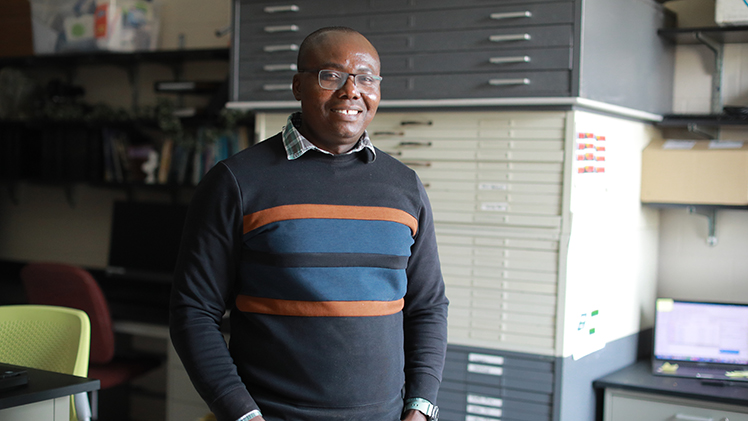Environmental scientists are used to getting their hands dirty, particularly if they’re interested in the properties and processes of soil.
Samples and sensors have long been standard operating procedures when it comes to gathering data in this line of research. But there are limitations inherent to these point-by-point measurements, said Dr. Kennedy Doro, an assistant professor in The University of Toledo’s Department of Environmental Sciences.

Dr. Kennedy Doro, an assistant professor in the Department of Environmental Sciences, studies the environmental applications of geophysics. His latest research is supported by a National Science Foundation CAREER Award.
That’s why he’s among the environmental scientists exploring more holistic ways to gather data about shallow subsurface environments through the use of geophysical imaging techniques. He recently received a five-year, $680,238 award through the National Science Foundation’s Faculty Early Career Development (CAREER) Program, supporting his research proposal focused on coastal systems that are facing transformation tied to a warming climate.
“Discontinuous point measurements are not enough information for us if we really want to know what is happening within the soil,” Doro said. “Through this project we’ll develop ways to scan the subsurface and learn more about the environment without having to dig.”
CAREER Awards are among the most prestigious under the National Science Foundation, and they support early-career faculty who have the potential to serve as academic role models in research and education and to lead advances in the mission of their department or organization. Doro is one of two recent awardees at The University of Toledo. Dr. Abbas Semnani, an associate professor in the Department of Electrical Engineering and Computer Science, also received a 2024 CAREER Award.
“It’s very exciting,” Doro said. “There is no better award to get as an early career professor.”
Doro specializes in environmental applications of geophysics, a combination of geology and physics that until relatively recently was more commonly applied toward the identification of subsurface resources like oil, gas and mineral deposits. Doro applies geophysical methods such as electrical conductivity and induced polarization, in which an electric current is transmitted or stored in the subsurface, to instead investigate ecological processes that occur beneath the soil surface. What can the electrical conductivity of an environment tell us about the way water cycles through it, for example?
Doro studied geology at Delta State University in Nigeria, and continued his education with a master’s degree in applied and environmental geoscience and a doctorate in applied geoscience from the University of Tuebingen in Germany. Since he joined the faculty at UToledo in 2019, he has lent his expertise in geophysics to several ongoing environmental research projects including the H2Ohio Wetland Monitoring Program and Coastal Observations, Mechanisms and Predictions Across Systems and Scales (COMPASS-FME).
COMPASS-FME is a large-scale collaborative effort to collect coastline data to ultimately improve models predicting the consequences of a changing climate. It’s headed by the Department of Energy’s Pacific Northwest National Laboratory, and UToledo leads operations in the western basin of Lake Erie.
Doro will build on COMPASS-FME in his research supported by his CAREER Award, for which he plans to utilize data from COMPASS-FME and non-COMPASS-FME sites along Lake Erie and the Chesapeake Bay. His proposal calls for both the development of geophysical methods to scan sites, rather than sampling at discrete points, and for an investigation into what we can learn from the resulting data.
“We think that as microbes feed on nutrients in the soil, they create electrical signals,” Doro said, offering an example. “Can we measure these electrical signals? And what can these signals tell us about the biogeochemical processes that are occurring in these areas where land meets a body of water?”
These coastal interfaces are particularly significant in the face of increasingly intense disruptions to the ecosystem, like seiches or sea level rise, that are tied to a warming climate.
“These regions do a lot for us,” Doro said. “Scientists have discovered that they’re very reactive. There are reactions that take place there that transform nutrients and chemical substances before they reach bodies of water, sometimes making them less dangerous environmental contaminants.”
CAREER Awards support both research and education, and Doro plans to train his students on the methods he develops and applies to his target sites in Lake Erie and the Chesapeake Bay. His award will support two undergraduate students and one doctoral student to work with him each year of the five-year award period, as well as the development of an undergraduate course on applied environmental geophysics that he anticipates will have a cross-disciplinary interest among students studying environmental science, engineering and archeology at UToledo.
“The goal is to expand the types of measurements we can take,” Doro said. “Environmental scientists have options beyond discontinuous point measurements. We can compare it to a doctor, who no longer has to perform surgery or a biopsy to find out what’s happening within the body. In many cases, they can use techniques such as MRI. We’re doing the same thing to the ground.”